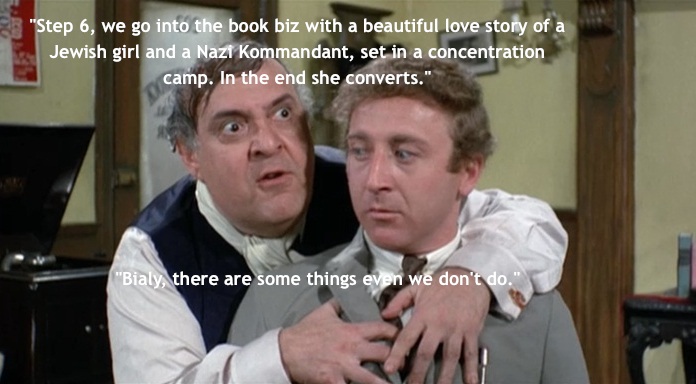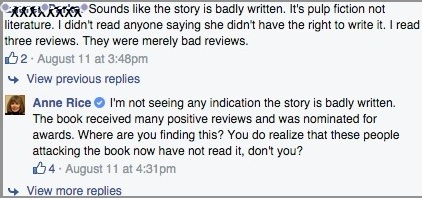
From the GOP Debate 8/6/15:
Megyn Kelly: You’ve called women you don’t like “fat pigs, dogs, slobs, and disgusting animals…. Your Twitter account has several disparaging comments about women’s looks. You once told a contestant on Celebrity Apprentice it would be a pretty picture to see her on her knees. Does that sound to you like the temperament of a man we should elect as president….?
Donald Trump: …I think the big problem this country has is being politically correct.
———
Mob: (a) a riotous or disorderly crowd of people
— Collins English Dictionary
- Lynch: To put to death by mob action without legal authority.
- — Dictionary.com
Recently several media outlets on the web have reported bestselling author Anne Rice’s stand against what she characterizes as “internet lynch mobs” practicing what she calls “censorship by bully” in the name of “political correctness.”
While Rice has spoken about this issue before, her most recent call to action to her Facebook followers has involved the controversial Jewish-nazi romance novel, For Such a Time. FSAT offers a happily ever after ending to the holocaust after “blonde and blue-eyed Jewess,” (from the book cover) Hadassah Benjamin, converts to Christianity and plans a future with the former (fictional) commandant of Theresienstadt, who has also accepted Jesus into his heart (Glory Hallelujah) and been “forgiven by God” (quote from text) for the mass murder stuff. And oh yeah, Hadassah had been his prisoner for most of the novel, and he threatened to send her back to Dachau.
For those of you who haven’t been on the internet recently, I’m not making this book up. This isn’t a parody. It’s what some 5-star reviewers have referred to as “a beautiful love story.” And no, it was not published by Bialystok & Bloom, but by Bethany House, a Christian publisher. Marketed to a niche audience, it didn’t attract much attention or controversy. However, once it was nominated for an award as both a first novel and best “inspirational” novel by the Romance Writers Association, wider attention came. Romance writer Sarah Wendell published a letter to the RWA expressing her concerns regarding the nomination. There was also a review on the romance book blog, Smart Bitches, Trashy Books, giving the book a “D” grade. After that, came reposts and more opinion pieces in a range of print and internet publications. Plus some very detailed blog reviews like this one and this “sad but not angry” epistle from a Christian addressed to Bethany House. It’s also led to an increase in reviews for the book — both positive and negative, on the book’s Amazon review page.
Rice admits to never having read the book, and appears not to have read much about it, stating that she doesn’t need to in order to defend the principle – the author’s right to explore ideas, and she compares the controversy to pre-internet uproars over books now considered classics such as Lolita. The crux of her argument is that there is an organized “internet lynch mob” targeting this book and its author with the aim of “gaming” Amazon’s review system by flooding it with “false” negative customer reviews in an attempt to lower the book’s customer rating and thereby “censor” the author. (All Anne Rice quotes here are from her Facebook page. Many screenshots to come.) She claims this is not a campaign against negative reviews, but against “false” ones, e.g. reviews where people haven’t read the book, but are relying on what she terms “gossip” about it. She doesn’t accept that there might be any other reason for leaving these reviews, other then as part of an organized “gang” to “sabotage” the author and sink the book. Nor is she clear on how she knows that these reviewers haven’t read the book. She continually uses the (not at all incendiary) phrase “lynch mob” to describe what is happening. When a poster mildly disputes her version of recent reviews, Rice doubles-down and questions the authenticity of all recently posted negative reviews that call the book badly written, classifying these as “attacks” by “these people.”
She has called the people leaving these negative reviews “immoral,” “unethical” and characterized them as “bullies.” Furthermore, she has called her followers to action, repeatedly urging them to report these “fake” negative reviews to Amazon because, she asserts, not having reading the book is a violation of Amazon’s review guidelines. At the same time, she states many times that this is NOT about “legitimate” negative reviews. Perhaps she’s ultra-sensitive to this given her own reputation for over-reacting to negative criticism of her own work, as during her meltdown in 2004, when she attacked Amazon reviewers lambasting their “stupidity” and accusing them of “interrogating the text from the wrong perspective,” all this in a “5-star review” she posted of her own work on Amazon. More recently she has been criticized for going after what she considers “bully” reviews although adding the term “political correctness” seems new.
While media for the most part has accurately portrayed Rice’s basic argument against the “lynch mob” “attacking” Kate Breslin and her book, what they have not done is explored whether or not she’s correct in her assessment of what’s going on and/or whether or not her statements are factual. Whether or not, in fact, such a lynch mob even exists. They have taken her statements at face value, framing this as Rice taking a stand against internet “bullying” and “censorship.” They have accepted her premise that there is an organized “gang” attempting to take the book down in the name of “political correctness.”
But don’t responsible journalists have an obligation to explore her assertions first? Is there a mob? Is there even a mob mentality? Is there a “campaign” to flood the book’s page with “false” reviews in an attempt to “sabotage” an author and end her career? Is the book’s page “flooded” with reviews in which the readers haven’t read the book? What is Rice’s criteria for determining whether or not a review is “false” or for that matter whether or not one has read the book? What in fact is the nature of the critique offered in the negative reviews on the book’s page?
It’s as though someone were making the claim that we are discriminating against our immigrants from Pluto, and this is morally reprehensible.
In short, before debating whether or not flooding a review site with “false” reviews in the name of political correctness is the biggest threat to free expression in history, shouldn’t we be asking whether or not that’s what’s happening in this case?
This is the first in what will be a series of posts. Like Anne Rice, I’m not overly concerned in this (and future) posts with the content of Kate Breslin’s book or what Rice terms its “transgressive ideas,” and others have called its “offensive premise,” “historical inaccuracy” “anti-semitism,” etc. I am concerned with exploring whether there is any evidence to support the specific allegations, claims, and accusations made by Rice regarding the critics and criticism of For Such a Time, specifically as expressed on the Amazon review page for that book. I will explore whether or not her incitement and exhortations to her fans to “report” and “down-vote” negative reviews is in itself an example of the very things she claims to oppose – organized unethical internet mob activity and attempting to “game” the Amazon review system.
This is going to be a very long and somewhat data driven post. I have many screenshots saved, as people have a tendency to backtrack and delete posts. I want to get this right. So please bear with me until at least tomorrow.
Coming soon, Part II Manufacturing Outrage or Who’s Zoomin Who? (Update: Anne Rice has taken down all her facebook posts on this because that’s what she does. I am planning to continue this series, if only because I started it, but there’s a lot to unpack.)


